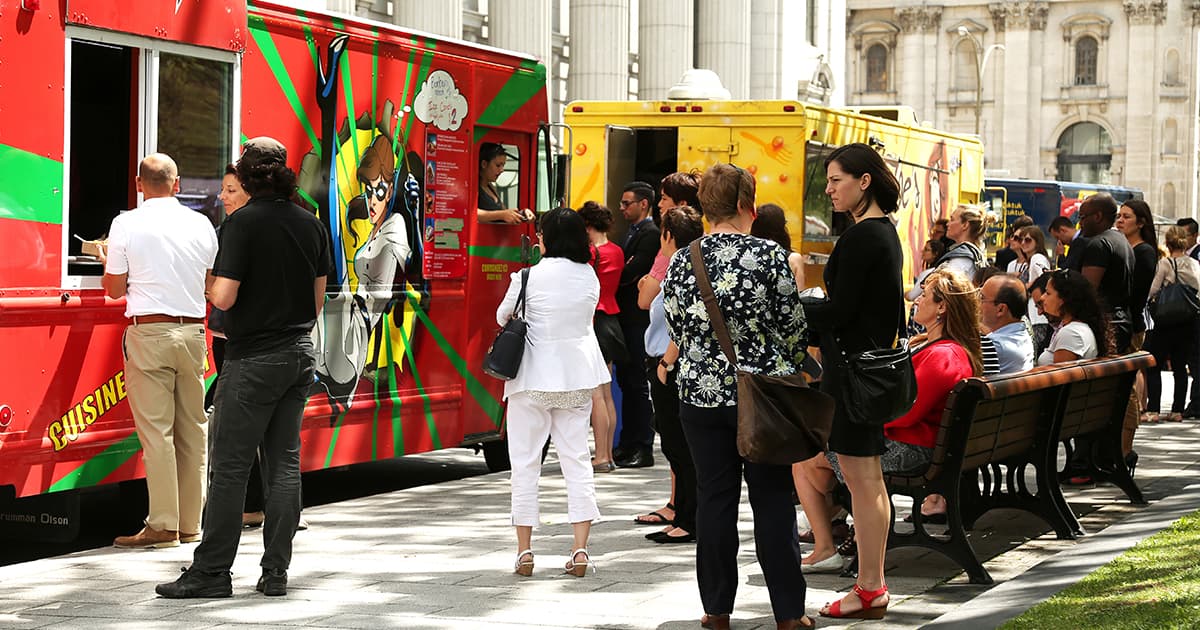What Insurance Do Food Trucks Need?

If you sell food or drink from a truck on the street, you need food truck insurance. Insurance for food trucks helps protect you against things like food poisoning, vandalism, and mechanical breakdown of your equipment.
You’ll also need commercial auto insurance for your food truck because all motorized vehicles driven on public roadways and streets need liability coverage. Check the province or territory where you live for the exact vehicle insurance requirements for your motorized food truck.
Examples of food trucks that need insurance
- Ice cream
- Hot dog
- Sandwich/subs
- Pizza
- Burger
- Taco
- French fry
- Lobster roll
- BBQ food/ribs
What kind of food truck insurance should I have?
Commercial general liability (CGL) insurance: CGL insurance protects you, for example, if a third-party (customer or supplier) gets injured or their property damaged. For example, a supplier catches his hand on a loose piece of metal on your food truck’s counter needs stitches. Your commercial general liability insurance could help cover the cost of their medical bills.
Product liability insurance: Product liability insurance is recommended for anyone who makes and sells food products. It protects you against allegations of property damage or bodily injury caused by a product you manufacture, distribute, or sell, including your food. For example, if a customer complains of food poisoning after eating your food at your food truck, their medical costs and your legal fees could be covered by product liability insurance.
Commercial property insurance: Commercial property insurance protects your food truck and also provides coverage for your equipment and inventory. It covers fire, theft, and specific severe weather events such as windstorms.
Equipment breakdown insurance: Equipment breakdown insurance can help cover the costs of repairing or replacing equipment that’s damaged due to mechanical failure or electrical issues. This policy can also provide financial coverage for the lost revenue and food spoilage directly related to the breakdown. For example, if your commercial freezer breaks down, equipment breakdown insurance can help cover the repair costs and the estimated lost revenue.
Business Interruption Insurance: If you have an insured loss involving your food truck that is severe enough to prevent it from being open, the expenses associated with getting your food truck business running again will be covered.
Business interruption insurance usually covers vandalism, fire, wind, flooding, and other risks (make sure to understand what your policy covers). Your policy will help compensate you for lost income and expenses that you will need to continue paying even while you are unable to work.
Cyber Insurance: If your food truck processes debit and credit card transactions, online or in person, you need cyber insurance. Your system could be vulnerable to cyberthieves.
Without cyber insurance, you will have to pay out of your pocket for the cost of restoring your bakery’s system if it’s hacked.
You may also be liable for damages to third parties whose information has been stolen and you may have to pay for notification expenses to inform customers affected by a breach.
How much does insurance for food trucks cost?
Food truck insurance will depend on the following factors:
- Years of experience
- Locations served
- Type of vehicle
- Annual and projected revenues
- Number of employees
- Past insurance claims
Every small business is unique, which means there’s no set price for food truck insurance.
It’s important to note that your food truck probably needs a commercial general liability policy with a limit of $2 million.
Did you know? When you switch to Western Financial Group you can save up to 30% on car and home insurance.



